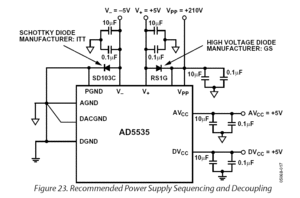SiPM digital control board power supplies
Revision as of 18:41, 25 June 2008 by Underwood (talk | contribs) (→+3.3V supply: added EEPROM voltages)
As seen in the SiPM digital control board netlist, the ICs on the control board have many different power requirements. This page suggests some compatible voltage supplies that will be necessary on the board. To reduce the number of backplane connections and the number of external supplies needed, some of these supplies might be created using voltage dividers on the control board.
+210V supply
Use for:
- AD5535 DAC
- VPP high voltage supply
- Using this high voltage will allow for large adjustments of the SiPM amplifier bias voltages. Large variations may be necessary because the MATLAB model showed that adjustments between 0 and +50V had no effect on the SiPM.
- VPP high voltage supply
+5V supply
Use for:
- AD5535 DAC
- V+ amplifier supply pins
- AVCC analog supply pins
- DVCC digital supply pins
- AD7928 ADC
- AVDD pins
- indicates measuring range of 0 to 2xREF_IN voltage
- AVDD pins
-5V supply
Use for:
- AD5535 DAC
- V- amplifier supply pins
+3.3V supply
Use for:
- AD5535 DAC
- REF_IN supply
- Using +3.3V for REF_IN limits the SiPM amplifier bias voltages to a maximum of 165V. If greater variability is needed (up to +200V max), a separate +4V supply can be used for REF_IN, perhaps taken from the +5V rail via a voltage divider.
- REF_IN supply
- AD7314 temperature sensor
- VDD supply
- indicates ±1°C accuracy
- should make compatible with 3.3V CMOS logic
- VDD supply
- CP2201 Ethernet
- AV+ analog supply
- VDD1 digital supply
- VDD2 digital supply
- FPGA
- VCCAUX auxiliary supply
- Can also operate at +2.5V, but to reduce the number of supplies needed, we will operate in +3.3V mode
- VCCO I/O logic supply
- Makes it compatible with 3.3V CMOS logic
- Puts it within acceptable range of voltages for communication with other ICs
- VCCAUX auxiliary supply
- XCF01S EEPROM
- VCCINT internal supply
- VCCO output driver
- Matches 3.3V I/O on FPGA
- VCCJ JTAG output driver
- Are we using this?
